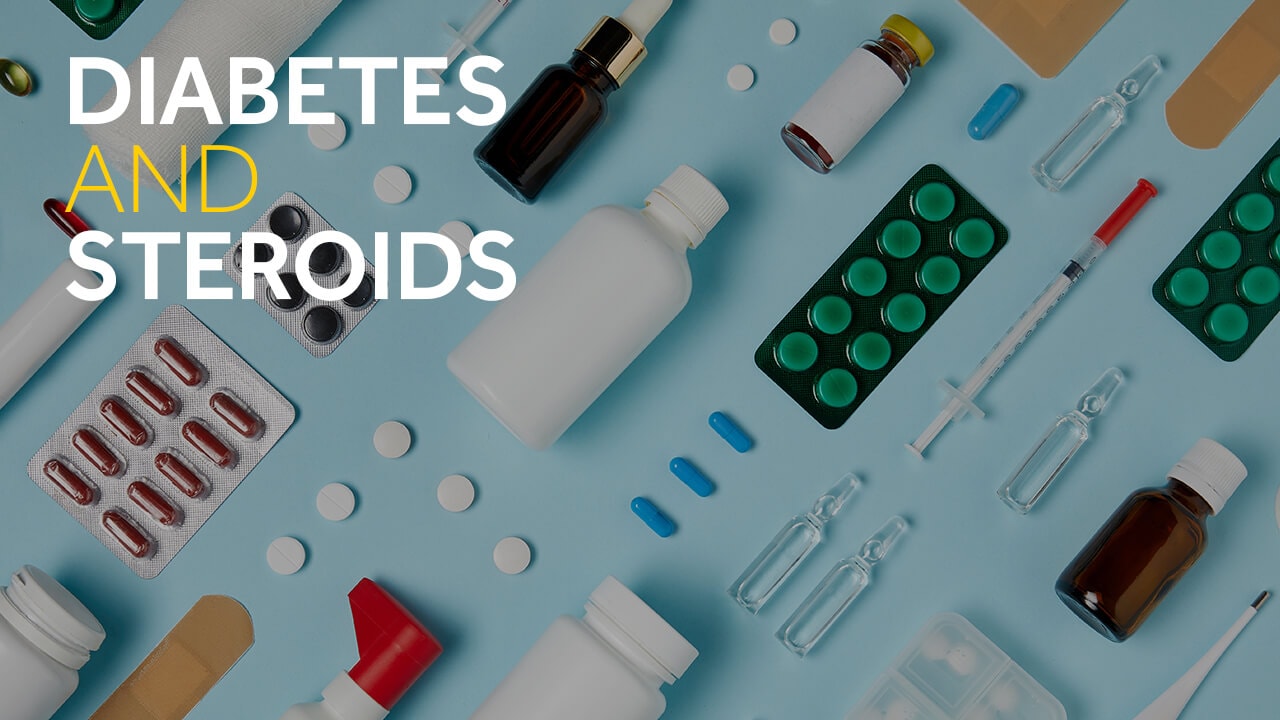Oral Corticosteroids (prednisolone and dexamethasone)

Prednisolone and other corticosteroids
Corticosteroids are the official medical term for what is commonly shortened as “steroids.” Corticosteroids are man-made drugs that closely resemble cortisol, a hormone that your adrenal glands produce naturally.1 Some corticosteroid medicines include cortisone, prednisolone, and dexamethasone.
Corticosteroids work by reducing inflammation and activity of the immune system. They are often used in conditions such as asthma, arthritis, and lupus. Steroids may be the main therapy for certain diseases. For other conditions, steroids might only be used sparingly or when other measures have not been successful.2 Here we will focus mostly on the oral steroids prednisolone and dexamethasone.
Oral or injected corticosteroids can affect blood sugar control
Corticosteroids can make the liver less sensitive to insulin because they cause it to keep on releasing sugar, even if the pancreas is also releasing insulin. This continued release of sugar triggers the pancreas to stop producing the hormone.3
Corticosteroid medicines such as prednisolone and dexamethasone can change how your body handles carbohydrates and glucose. They can raise your blood sugar level by blocking the action of insulin.
Having diabetes, you need to be aware that your glucose levels may rise while taking steroids orally or via injection. If your blood glucose levels rise significantly, you may need to increase or change your diabetes medication.
Do steroids raise blood sugar?
People taking corticosteroids should regularly monitor their blood sugar levels and may need to take oral medication or insulin (or higher doses if already on these) if glucose levels become too high.
Generally, blood sugar levels should return to their previous levels soon after finishing steroid treatment. Occasionally, effects may last longer depending on dose and route (steroid injection effects often last longer).3
Common side effects and proactive management
Side effects depend on the dose of medication you receive, and in addition to an increase in glucose, short-term effects may include:
• A buildup of fluid, causing swelling in your lower legs.
• High blood pressure.
• Problems with mood swings, memory, behavior, and other psychological effects, such as confusion or delirium.
• Upset stomach.
• Weight gain in the belly, face, and back of the neck.4
If you are prescribed corticosteroids for any reason, it’s important to notify your provider of the dose and duration you have been prescribed. If you have been on corticosteroids before, you may discuss previous glucose trends during steroid use and adjust medications accordingly.
Keep a record of your glucose throughout the day or share CGM data often with your provider during this time so adjustments can be made.
Learn more about steroid and diabetes and the effect on high blood sugar.
Guest author: Lisa Nicolussi, RN BSN CDCES, Medtronic employee
References
1. 2023, October 29. Corticosteroids and diabetes. Diabetes.co.uk. https://www.diabetes.co.uk/diabetes-medication/costicosteroids-and-diabetes.html
2. 2020, January 20. Corticosteroids. Cleveland Clinic. https://my.clevelandclinic.org/health/drugs/4812-corticosteroids
3. 2022, September 29. What is the link between prenisone and diabetes? Medical News Today. https://www.medicalnewstoday.com/articles/317015#steroid-induced-diabetes
4. 2022, December 9. Prednisone and other corticosteroids. Mayo Clinic. https://www.mayoclinic.org/steroids/art-20045692



